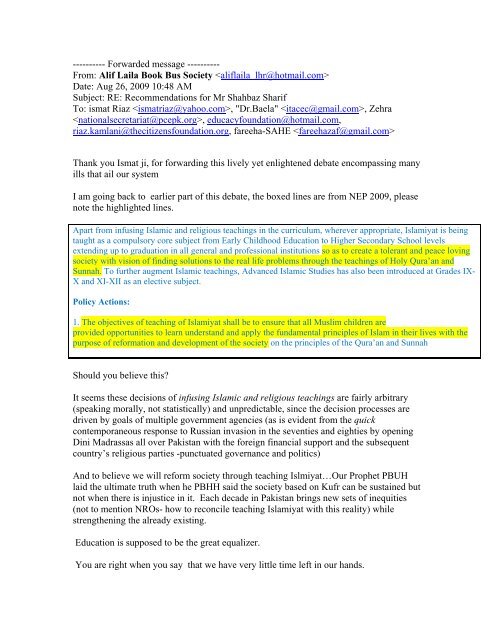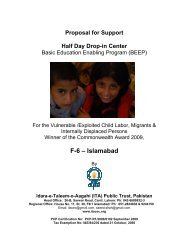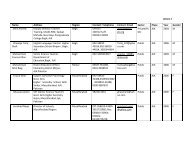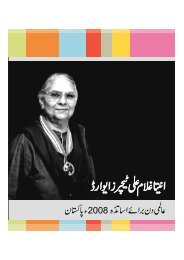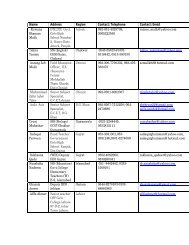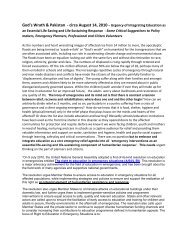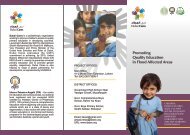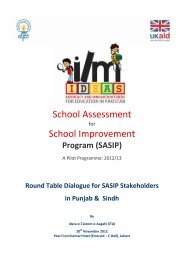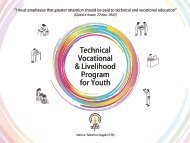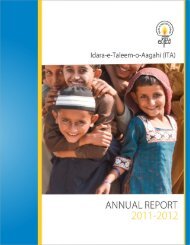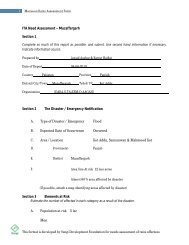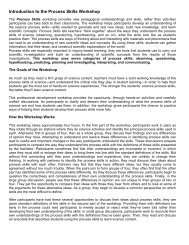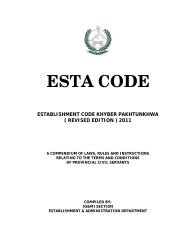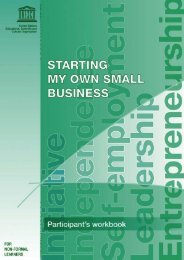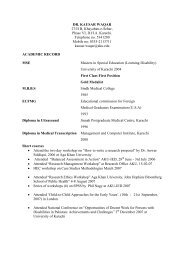Recommendations for Mr Shahbaz Sharif
Recommendations for Mr Shahbaz Sharif
Recommendations for Mr Shahbaz Sharif
You also want an ePaper? Increase the reach of your titles
YUMPU automatically turns print PDFs into web optimized ePapers that Google loves.
---------- Forwarded message ----------From: Alif Laila Book Bus Society Date: Aug 26, 2009 10:48 AMSubject: RE: <strong>Recommendations</strong> <strong>for</strong> <strong>Mr</strong> <strong>Shahbaz</strong> <strong>Sharif</strong>To: ismat Riaz , "Dr.Baela" , Zehra, educacyfoundation@hotmail.com,riaz.kamlani@thecitizensfoundation.org, fareeha-SAHE Thank you Ismat ji, <strong>for</strong> <strong>for</strong>warding this lively yet enlightened debate encompassing manyills that ail our systemI am going back to earlier part of this debate, the boxed lines are from NEP 2009, pleasenote the highlighted lines.Apart from infusing Islamic and religious teachings in the curriculum, wherever appropriate, Islamiyat is beingtaught as a compulsory core subject from Early Childhood Education to Higher Secondary School levelsextending up to graduation in all general and professional institutions so as to create a tolerant and peace lovingsociety with vision of finding solutions to the real life problems through the teachings of Holy Qura’an andSunnah. To further augment Islamic teachings, Advanced Islamic Studies has also been introduced at Grades IX-X and XI-XII as an elective subject.Policy Actions:1. The objectives of teaching of Islamiyat shall be to ensure that all Muslim children areprovided opportunities to learn understand and apply the fundamental principles of Islam in their lives with thepurpose of re<strong>for</strong>mation and development of the society on the principles of the Qura’an and SunnahShould you believe this?It seems these decisions of infusing Islamic and religious teachings are fairly arbitrary(speaking morally, not statistically) and unpredictable, since the decision processes aredriven by goals of multiple government agencies (as is evident from the quickcontemporaneous response to Russian invasion in the seventies and eighties by openingDini Madrassas all over Pakistan with the <strong>for</strong>eign financial support and the subsequentcountry’s religious parties -punctuated governance and politics)And to believe we will re<strong>for</strong>m society through teaching Islmiyat…Our Prophet PBUHlaid the ultimate truth when he PBHH said the society based on Kufr can be sustained butnot when there is injustice in it. Each decade in Pakistan brings new sets of inequities(not to mention NROs- how to reconcile teaching Islamiyat with this reality) whilestrengthening the already existing.Education is supposed to be the great equalizer.You are right when you say that we have very little time left in our hands.
50% out of school children is not the concern of our governments, hence the risingpoverty, crime, violence, extremism and terrorism.3. The Financial Issue, Corruption and inefficiency. Minimal allocation of 2.2 % ofGDP as against the minimum recommendation of 4 % by United Nation. 80 % ofthe allocated funds <strong>for</strong> education are not used but returned to finance department inthe month of April every year. Most of the 20 % known to be used areimbazzled resulting in 30,000 Ghost Schools drawing funds reported by ConsumersRights Commission of Pakistan in 2006. No accountability of those involved so far.4. Poor Quality education. This particularly refers to non-elitist schools in thepublic sector and some in the private sector opened <strong>for</strong> business and not service.The reasons <strong>for</strong> this are as follows:a) Poor quality of head teachers/principals. They are mostly not trained inadministration, unaware of modern development in education and theirappointments are based on seniority plus favoritism and not on their aptitude <strong>for</strong>this highly challanging job.b) Poor quality of teachers due to low status of teachers, poor and highlyunattractive service conditions of teachers that do not attract talent, lack of preserviceand in-service teachers training, outdated teachers training, absence ofaccountability <strong>for</strong> their per<strong>for</strong>mance, automatic promotions on seniority, lack ofincentives and recognition <strong>for</strong> better per<strong>for</strong>mance and their selection on favoritismand nepotism and not on merit.c) Outdated Curriculum. National Objectives of Education are general. They needto be translaied in to more specific objectives <strong>for</strong> all levels of education i.e. primary,secondary, higher secondary, graduate, professional and postgraduate education, tobe meaningful <strong>for</strong> conversion into learning content or syllabi. Objective basedlearning resources are absent or of poor quality. Locally authored text booksare substandard. Imported books are excellent but expensive and are not used.Libraries in schools hardly ever exist, computers are not there, Extracurricularactivities that are essential <strong>for</strong> holistic education to develop character andpersonality are missing.d) Out dated methods of teaching/learning relying on passive transfer ofin<strong>for</strong>mation through lectures or dictation of notes tuned to rote memorization areleast likely to lead to mental growth <strong>for</strong> critical thinking, problem solving appliedabilities and creativity.e) Outdated system of exmnations held at long intervals with choices in the essaytype question papers, entirely subjectively assessed, unjust, invalid and unreliableare dictating the methods and style of teaching and learniing putting all reliance onselective memory work that has prevented any change in our system of educationand must be outrightly rejected and replaced.
d) Poor participation of Parents and the Community in education of childrenperhaps partly due to unawareness of both but to a larger extend due to its neglectby the schools is contributory to the poor quality of education,E) The lack of physical facilities in public sector schools as pointed out by severalservays are deplorable.Finally education must be openminded, holistic, encompassing all sources ofknowledge and free of all prejudices. I hope that I have not wasted your pressioustime by saying something that you all know but wiyhout their solution no progresscan be made to solve the problems of Pakistan.With warmest regards,Yours sincerely.Siraj---------- Forwarded message ----------From: ismat riaz Date: Aug 25, 2009 10:20 AMSubject: RE: <strong>Recommendations</strong> <strong>for</strong> <strong>Mr</strong> <strong>Shahbaz</strong> <strong>Sharif</strong>To: Ilyas khan Cc: Siraj Ahmed , Shahid Siddiqui, Baela Jamil , Beena Raza, ateed riaz , Mubarak Ali, Rabia , Amera Hamid, Zahra Ahmed ,Mobeen Sheikh , abeera Sheikh ,Umar Riaz , s.tariq@princeton.eduDear Ilyas SahibYou have come up with some very valid points and you have not taken up my time. Thewhole point now is to widen debate and discussion on educational policy and our ef<strong>for</strong>tsshould be <strong>for</strong> that - <strong>for</strong> too long our system has stagnated and and 'quick fixes' have nothelped. For once and <strong>for</strong> all we must overhaul the system (my suggestion since the last 10years at least) so that all aspects of education are uplifted at the same time <strong>for</strong> maximumbenefit.I have also suggested that an independent body of committed, honest, selfless Pakistanicitizens should be given the task of effecting change and then diligently monitoring it.The Chief Minister makes these Task Forces on such and such matters but hardly anysolid work gets done. The govt and NGOs both have their interests to protect so peoplefrom there do not sincerely wish the re<strong>for</strong>m to take effect as they are also pressurised by
other bodies whose vested interests are at stake. There is also the aspect of not thinkingthe re<strong>for</strong>m through - <strong>for</strong> example, universities are now adopting the 4 year B.A/B.Scdegree but the pedagogy is the same. The modules have been made but the thinkingpatterns are again not being tapped because teachers have not been trained to change theirteaching styles.Consequently, a massive ef<strong>for</strong>t has to be done to get anywhere and the further itdeteriorates despite the interventions these days, the more difficult it will get to makeeffective re<strong>for</strong>ms. We need an aggressive 5 year phased plan to accomplish somethinglike this. It should also look 20 years ahead <strong>for</strong> what it wants to achieve <strong>for</strong> the progressof the country. Short term re<strong>for</strong>ms are a waste of time, money and ef<strong>for</strong>t.Very warm regards and best wishes to youIsmat Riaz--- On Mon, 8/24/09, Ilyas khan wrote:From: Ilyas khan Subject: RE: <strong>Recommendations</strong> <strong>for</strong> <strong>Mr</strong> <strong>Shahbaz</strong> <strong>Sharif</strong>To: "ismat riaz" Cc: "Siraj Ahmed" , "Shahid Siddiqui"Date: Monday, August 24, 2009, 6:32 PMDear Ismat Riaz,Thank you <strong>for</strong> your email again. Yes there is no comparison between anytwo phenomenon in the world but paradoxically there IS comparisoneverywhere . You cannot compare two flowers with each other on the onehand but on the other hand you can compare an flower with a thorn(andquite often this comaprison and contrast helps in broadening ourhorizens and understandings). And I think the difference between thetwo education systems we are discussing here is no sharper than thedifference between a flower and a thorn. There are of course connectionseverywhere and the connections here are quite obvious. Our conditionsmay have more similarities with what Marx or Freire says but ironically itis the West where their ideologies/works have got the real audience andif we wish to know about and try to introduce their ideas in oureducation system, probably we would need to reach them through the'western' medium. So no escape here. I would again say connecting 'rotelearning'with this phenomen (colonialism) is not entirely justified. Howlong should we live in and mourn the past? Rote learning has something
more to do with the overall culture of corruption, selfishness andincompetence that is prevailing in our country. The biggest issue thatcontributes to this phenomenon <strong>for</strong> me is the totally outdatedevaluation/examination system which is certainly not based on 'western'model and the pathetic conditions in our educational institutions plusthe miserable lot of the school teachers. Time and time again we blameour colonial past <strong>for</strong> our present problems. Of course history cannot beoverlooked in finding out roots of problems in the present but living inhistory, keep on cursing it, and not moving on(like as you pointed out theWest has moved on) is the curse we need to pay heed to. If they canimpose their bad things on us at one point of time, why can we not taketheir good things at another point of time in history? However Iunderstand your point that is that we should develop our own culture ofresearch based on our own needs and requirements. I have to someextent read the books/articles of both Dr Shahid Siddiqui and Dr.Siraj (Iread Dr. Siraj's book 'Quality Education' a few years ago and there were afew sections in it which were beyond me at that time! Dr.Siddiqui'srecent book which is lying under my pillow even now and his articles innewspapers are quite eloquent and I love his style of presenting ideas,excellent work) and some from the AKU people (on reflective practices). Ifeel their works are very genuine and rooted in our problems. I wish wehave some more like them. Genuine research on our own issues andcoming up with our solutions to problems that we face is something thatmust always be welcome, but that does not in anyway mean some kindof chauvinistic blockage to every '<strong>for</strong>eign/western' idea which I think iswhat some hardliners would like people to do. Of course I understandyour point of view and I know what you want to convey has nothing to dowith that kind of 'exclusivist' thinking. I fully agree with you that we havevery little time left in our hands. We need to right the wrong that hasbeen accumulated <strong>for</strong> years by the wrong policies of those who matter inour country. Keeping our eyes and ears and most of all our minds opento learning from anywhere (East or West or North or South) but holdingon to the 'centre' is what is the need of the hour. Probably I took a lot ofyour precious time. Sorry <strong>for</strong> that!Warm wishes and regardsIlyas--- On Sat, 8/22/09, ismat riaz wrote:From: ismat riaz Subject: RE: <strong>Recommendations</strong> <strong>for</strong> <strong>Mr</strong> <strong>Shahbaz</strong> <strong>Sharif</strong>
To: "Ilyas khan" Cc: "Siraj Ahmed" , "Shahid Siddiqui"Date: Saturday, August 22, 2009, 11:46 PMDear Ilyas SahibI am not against accessing western research or its effects on teacher education in Pakistanbut was trying to make this point that the standard of education is so low especially ineducational provision in Pakistan whether they be students, teachers or administrators inschools and colleges. Just a small example that I was <strong>for</strong>warded a journal article writtenby a teacher at Univ of Education, Lahore, in which the research had been to compareUK and Pakistan in terms of how the provinces were equal in number and how they weresimilar in provision of education. Firstly, there is no comparison between UK andPakistan (as a Norwegian International Education expert critqued my journal article whenit was sent to him as a second referee). That's is what I meant that at present ourunderstanding of this field is quite poor and the BA/BS B.Ed four year programmesyllabus is entirely made up of books produced in the West i.e USA and UK.(All booksbeing produced in Pakistan by AKU-IED and also, to name Professor Siraj and ShahidSiddiqui Sahib- these are genuine research based books on our conditions+ westerneducational literature).I hear that Universities who have taken it on the BS BEd are justmaking the students rote learn again - So, will conditions improve in the classroom??I would like to contest your following staement:'Reception model' and 'rote learning' cannot be attributed to'western/English' education. We can see rote learning is more rampantin Urdu medium educational institutions than is probably the case withEnglish medium institutions. So the problem is not the 'medium' itactually is the 'mode/type' of education that we provide and theoverall culture of (incomeptence, corruption and irresoponsibility) oureducational institutions that has reduced them to 'degree producingmills'I am afraid my research fo my M.A thesis was on colonial education in the sub-continentand the findings revealed that it was the system of western education set up under LordMacaulay that had rote learning as its basis and the lecture method of transmission as thepedagogy. We have continued to do that (now both in Urdu and English medium schoolsand made them just result orientated or per<strong>for</strong>mance based) although the West has movedon and people like John Dewey (USA) and others made a break to find better learningtechniques. Why don't we apply Paulo Freire's "Pedagogy of the Oppressed" that mayaddress our problems better or Karl Marx's theory. Their conditions reflect ours morethan the West whose system was suited to their own conditions.The debate, Sir, is not that 'Why should we not access what the West has to offer' but findways and means to sit done and evolve what is suited to our NEEDS and not make the
mistake of using terms to show how well we know the educational literature (as is thecase in Pakistan) but be able to get to the underlying meaning to adapt it. Pakistan hasprecious little time left to put its education on track and eliminate corruption andintellectual piracy with laws that will curtail all this. Only then will we succeed in ourgoals as a nation.With best wishes <strong>for</strong> a properous PakistanIsmat Riaz--- On Sat, 8/22/09, Ilyas khan wrote:From: Ilyas khan Subject: RE: <strong>Recommendations</strong> <strong>for</strong> <strong>Mr</strong> <strong>Shahbaz</strong> <strong>Sharif</strong>To: "ismat riaz" Cc: "Siraj Ahmed" , "Shahid Siddiqui"Date: Saturday, August 22, 2009, 4:48 PMDear Ismat Riaz,Thank you very much <strong>for</strong> your emails and <strong>for</strong> sending me your articleand that photograph from the tribal areas. I agree with you, conditionson the ground in Pakistan are not ripe <strong>for</strong> the thorough application ofmany modern 'western' educational ideas including ideas from researchin the field of teacher education. The reason being that un<strong>for</strong>tunatelyeducation has never been one of our top priorities resulting in a completeabsence of neccessary infrastructure <strong>for</strong> the adoption of moderneducational theories and research. But just because we fail to provide <strong>for</strong>the needful in this vital area of our life, we cannot say we should nothave 'access' to the 'western' educational ideas. Let me explain this point:one such idea which has been established in the field of educationalpsychology is that it is always good that the teacher pay individualattention to the problems of students. Now we know it is not easy <strong>for</strong> aPakistani teacher to apply this concept in the classroom as he/she has tousually handle an overcrowded classroom where its extremely difficult topay individual attention. But does this 'practical difficulty' in any waymeans that the teacher should not have 'access' to this 'western idea' of'individual attention' just because it 'does not suit our conditions'? I dontthink so. There are many educational ideas that we find difficult to applyin practical life, but this does not mean we should discard them <strong>for</strong> wemust be congnisant of the 'potential value' that awareness about suchideas can bring to us. Your concern that Pakistani educational standardshave fallen over the years also in no way lead to the conclusion that it is
the case because we have 'access' to western ideas. We must know whatare the real causes of this overall deterioration. Lack of educationalfacilities/infrastructure should not be made a ground <strong>for</strong> denying ouryouth 'access' to modern 'western' research, rather ef<strong>for</strong>ts must be madeto provide the necessary infrastructure to enable our educational systemto catch up with the develped world.'Reception model' and 'rote learning' cannot be attributed to'western/English' education. We can see rote learning is more rampantin Urdu medium educational institutions than is probably the case withEnglish medium institutions. So the problem is not the 'medium' itactually is the 'mode/type' of education that we provide and theoverall culture of (incomeptence, corruption and irresoponsibility) oureducational institutions that has reduced them to 'degree producingmills' instead of real centers of learning. Lack of political will andconsequently the availability of resources is the real issue. As <strong>for</strong> thesecular/religious debate, I wish to know how should teaching of sciences(and preparation of teachers <strong>for</strong> such subjects) such as physics,chemistry, biology and many social sciences be different in 'religious'education system from the one that is 'secular'? And let me clarify here'religious studies' is very much there in the curriculum of even many'secular' countries.As <strong>for</strong> the 'lots' of books that are now 'written' in Pakistan according to'our conditions' I hope they are genuine, a result of some real inspiration,research and creativity and I hope these authors acknowledge theoriginal sources and not just 'write' their own books. I remember oneprofessor in a university once handed me over a flash drive telling me'Ilyas I have written most part of a book on educational psychology whichis in this drive, kindly go through it, edit here and there and then I'll getit published and you would be a co-author with me'. When I wentthrough his 'book' it was all copy and paste from the internet! Probablyhe was trying to 'adapt' from western sources. When you suggest'adaptation' from western sources as far as research/knowledge inteacher education is concerned, I feel you talk on the 'tactical' level, inthat you are right and actually this is what happens in reality! But <strong>for</strong>me the ultimate aims remain the same and I dont find much of adifference in the western or eastern concept of a 'competent, skillful,resourceful, honest, responsible' person that a teacher should be.Regards
Muhammad Ilyas Khan--- On Fri, 8/21/09, ismat riaz wrote:From: ismat riaz Subject: RE: <strong>Recommendations</strong> <strong>for</strong> <strong>Mr</strong> <strong>Shahbaz</strong> <strong>Sharif</strong>To: "Ilyas khan" Cc: "Siraj Ahmed" , "Shahid Siddiqui"Date: Friday, August 21, 2009, 9:08 PMDear Ilyas SahibAssalamo-alaikumI just read your mail to Professor Siraj in which you ask:So what is it that is 'harmful' about 'accessing' from western education in terms ofTeacher education and how is it 'ironical' please?My reply is:Firstly, in the West systems are highly developed and teachers are educated (We cannotdoubt the good standard of a teacher's own education be<strong>for</strong>e they acquire teacher trainingthere) and then highly trained with no corners cut or corruption to get degrees and so<strong>for</strong>th. In Pakistan, the standard of education has fallen so much that our degrees are notrecognised abroad any more. Most of the better intake into professions is taken up byMedicine and Engineering/MBA etc. Most of these do not opt <strong>for</strong> a career in teaching asused to be a norm some years back. There are economic imperatives in taking up teachingbut that is fine too. One needs to earn. Un<strong>for</strong>tunately, the teacher cadre now suffers fromour own down graded system of education. The books accessed on teacher educationfrom the West are1) In English and in educational terminology that the West has made into a discipline.(You will agree that understanding is crucial to application)2) A lot of the new methodology is not suitable <strong>for</strong> Pakistan whose educationalinfrastructure is weak, and suffers from lack of resources (If you have power shortages,how can you use technology in the class?? etc)3) Research in education in the West is constant and is applied to their System (SecularSchooling as opposed to Pakistan which focuses on religious education as part ofeducation) as interventions. When some of that systemised infrastucture is not availablein Pakistan, how can you just apply that in Pakistani classrooms and hope <strong>for</strong> the best?Some schools in Pakistan have tried to change according to Western research but the
teachers still use the reception model of teaching and learning, eventually where stuff isrote learned.4) The ironic part is that Knowledge generation has been from the West in the last somany years and we have accessed that in Pakistan. No problem with that and we shouldcontinue to do so. However, where teacher education is concerned the scenario inPakistan is different and unless we adapt western teacher education material to adjust toour conditions, change will be minimal. You train a teacher in the best Western books butwhen they find conditions in classrooms different, what do they do? Regress to their oldways.An article of mine was published in a UK Journal "Improving Schools" and I am copyinga sentence from there which explicates this point:-Furthermore, this has made all schools autonomous in affectingchange <strong>for</strong> themselves. A lot of borrowing from other countries’education systems takes place but issues in knowledge disseminationarise. Real change is not effected because as Fullan (2005:10)explains: ‘the terms travel well, but the underlying conceptualizationand thinking do not.’ For this reason most schools implementmeasures which are only skin deep and cannot be sustained, whileignoring the damage being caused to the learning potential ofstudents.Secondly, Pakistan has followed the pre-partition courses <strong>for</strong> PTC, CT and B.Ed <strong>for</strong> thepast so many years and now needs to improve and bring in a curriculum <strong>for</strong> teachereducation that will suit our conditions and combat the deficiencies in our system. Blindfollowin from the West will only delay the process. Abdullah Sadiq Sahib sent aphotograph showing how an examination is taking place in the NWFP border areas. A lotof the African nations have also adpted the West's educational material but to suit theirconditions.A lot of books are now being written in Pakistan based on Western research methods onPakistani education and, these should be accessed and read as Teacher trainingcurriculum material, too.I will attach later a number of my articles which might make my insight into all of thisclearer.Best regards to allIsmat Riaz
--- On Fri, 8/21/09, Ilyas khan wrote:From: Ilyas khan Subject: RE: <strong>Recommendations</strong> <strong>for</strong> <strong>Mr</strong> <strong>Shahbaz</strong> <strong>Sharif</strong>To: "RIAZ iSMAT" , "Sirajuddin Ahmed"Cc: naeemsadiq@gmail.com, "Abdullah Sadiq" ,daudpota@gmail.com, ejaz@lums.edu.pk, itacec@gmail.com, basitb@lums.edu.pk,"Ahmad Iqbal" , aimal@void.co.jp, "Akmal", "Alaf Khan" , "Amjad Hussain", "Arshad Rehan" ,cymah80@hotmail.com, "Dr. AZIZ Salyani" , "Dr. IjazIjaz Ahsan" , "Dr. Abdulaziz Salyani", "faridullah Dr" ,"Hidatullah Arbab" , "Iqbal Dental Surgeon", "Irnum Dr.Sher Muhammad" ,"Mohammad Dr.Ishaq" , "Mohammad Faiq", "Muhammad Umar" ,muradali@invitation.sms.ac, "Murad Ali" , "Mushtaq HussainShah Bukhari The Educator" , "Omair Siraj", "professornajib" , "RuhulAmin" , "Shehzad Roy" ,"Shiraz" , "Tahir Mujib Dr." Date: Friday, August 21, 2009, 3:49 PMDear Dr. Siraj,I cannot agree more with whatever u have said on the issue. The real issue is ourincapacity to dig out the 'spirit' from the 'body'. Of course it is the ultimate end of a longroad of literalism spread through the self serving machinations of the <strong>for</strong>ces who'sinterests lie in keeping our people ignorant and away from the real spirit of religion.'Follow' and not 'think'( the recurrent message of Islam) is what these <strong>for</strong>ces would wishour people do. This has turned Islam from a <strong>for</strong>ce of internationalism andhumanitarianism to one of parochialism and brutal subjugation.There is an interesting end to one reply to your email which is: "The irony is that most ofour teacher education curriculum is being accessed from books written <strong>for</strong> the westerneducation systems. Will we find an answer there?" Does this mean there is somethingwrong with taking something out of 'western' ideas? If 'yes' what is it that is wrong?Could those who would advise us against 'accessing western books/ideas' enlighten us,what harmful effects would this course bring us? I mean it would be great to know someof the 'western ideas' that have come/been coming into our 'Teacher Education' and are
potentially harmful to our national health. So could a few such 'ideas' be identified?Interestingly some of us also take pride in the fact that the West has actually taken manyof their modern ideas from our great muslim scholars while at the same time take it as an'irony' if we take some of 'those' ideas back! Some of the 'western ideas' that I know havebeen included in our Teacher Education courses are: Reward is better than punishment inbringing positive change in the child's behaviour, the teacher should be well-preparedbe<strong>for</strong>e going into class, the teacher should understand the psycho-social positione of thechild be<strong>for</strong>e he is able to teach him, parents should be involved in the process ofeducation, lessons should be properly developed, students should be treated with care andrespect, they should be respected as thinking human beings not as statues or empty boxes,it is the responsibility of the state and the society to provide eduation to every child, theteacher should have sound knowledge of his subject, he/she should be a symbol of moralintegrity, honesty and efficiency and most of all he/she should be a 'thinking, creative,rational individual' and that he/she should deal with educational issues in a pragmatic,scientific manner. These are but a few of 'western ideas' that I know about and I feel thereis nothing wrong with any of them if we 'access' them. So what is it that is 'harmful' about'accessing' from western education in terms of Teacher education and how is it 'ironical'please?RegardsIlyas Khan--- On Tue, 8/18/09, Sirajuddin Ahmed wrote:From: Sirajuddin Ahmed Subject: RE: <strong>Recommendations</strong> <strong>for</strong> <strong>Mr</strong> <strong>Shahbaz</strong> <strong>Sharif</strong>To: "RIAZ iSMAT" Cc: snaqvi@hec.gov.pk, naeemsadiq@gmail.com, "Abdullah Sadiq", daudpota@gmail.com, ejaz@lums.edu.pk, itacec@gmail.com,basitb@lums.edu.pk, "Ahmad Iqbal" , aimal@void.co.jp,"Akmal" , "Alaf Khan" , "AmjadHussain" , "Arshad Rehan", cymah80@hotmail.com, "Dr. AZIZ Salyani", "Dr. Ijaz Ijaz Ahsan" , "Dr.Abdulaziz Salyani" , "faridullah Dr", "Hidatullah Arbab" , "Iqbal DentalSurgeon" , "Irnum Dr.Sher Muhammad", "Mohammad Dr.Ishaq" ,"Mohammad Faiq" , "Muhammad Umar"
progressive and inclusive religion and as a result there should be noobjection to teaching the substance of all religions which promote humanvalue and the welfare of humanity. I do not agree with the secular schoolwho are against religion every where neither do I agree with theexclusiveness of the religious extremists. As you have mentioned both theschools exist in every country and every religious group. We must evolveour own system based on reason and free of the bois and the prejudices ofthe extremist religious groups as well as those of the secular groups.I do not know when and how a consensus can be evolved on this issue. Ialways say God is the only uniting <strong>for</strong>ce <strong>for</strong> humanity. Un<strong>for</strong>tunately onsuch issues people get emotional and say good bye to reason. Pakistanis area very emotional and unreasonable selfcentered people as obvious by thepresent price hike in food article completely defying the purpose ofRamzan.Wishing you a very happy Ramzan.With warmest regards,Yours sincerelySirajDate: Mon, 17 Aug 2009 10:03:00 -0700From: ismatriaz@yahoo.comSubject: RE: <strong>Recommendations</strong> <strong>for</strong> <strong>Mr</strong> <strong>Shahbaz</strong> <strong>Sharif</strong>To: professorsiraj@hotmail.comCC: snaqvi@hec.gov.pk; naeemsadiq@gmail.com; asadiqr@gmail.com;daudpota@gmail.com; ejaz@lums.edu.pk; itacec@gmail.com; basitb@lums.edu.pkDear Siraj SahibThank you <strong>for</strong> your clarification. Since this is now an ongoing debate, let me introduce acouple of more ideas.Firstly, there is a school of thought that firmly believes that religion should not be part ofeducation in schools. The entire public education system of the UK and USA is based onthis premise. Where religion is part of the curriculum, those schools are private and arecalled 'Faith' schools. The highest number of Faith schools in the UK are Catholic andothers are Islamic such as the one run by Yusuf Islam in London. Ofcourse, missionaryactivity became an integral part of colonialism and thus faith schools were in largenumbers in the Indian sub continent, and some of these still exist but they teach Islamiyatas per national curriculum requirements since the majority of students are Muslims.Christians are taught the Bible instead of Islamiyat.
Secondly, the tradition in Muslim countries rested on the madrassa (school in Arabic) andit imparted Islamic teachings/disciplines as well as subjects like Philosophy, Logic,Rhetoric, Mathematics and others - it was a mix of relgious and secular subjects pluslanguages. You could rarely find people who understood less than three languages-Arabic, Persian, Turki and even Latin where the need arose.Thirdly, in the case of Pakistan, it is felt that Islamic teachings must be taught along withmodern subjects. As one scholar rightly pointed out that it is a case of 'grafting' i.emaking Islamiyat a subject in itself and adding it on to, <strong>for</strong> example, O Levels which area UK based curriculum. The other subjects perhaps may not be promoting the idea ofa Divine reality and are divorced from the 'Truth' taught in the religious sense. The factthat Darwin's theory can be part of this curriculum is questionable as it was in the USAwhen the Christians opposed it and it became a part of a court hearing and so <strong>for</strong>th.Fourthly, the argument would then be 'should religion be part of the educationalcurriculum or not?' My son categorically says that it should not be taught at all.According to him, it indoctrinates people into on particular mode of thought whereeverything is interpreted subjectively in the context of one religion. Secularly, everythingis taught objectively from no particlar standpoint. ( I am not familiar with this perspectiveso cannot explicate further on this idea)Finally, where do we stand vis a vis a Pakistan perspective? Science, Astrology,Astronomy, Geography, Historiography, Mathematics, Philosophy, Medicine, are all partof Islamic civilisation, too. Then what is the gap in the understanding of a modern,progressive thought process that will lead to an analytical and tolerant viewpoint ineducation.The irony is that most of our teacher education curriculum is being accessed from bookswritten <strong>for</strong> the western education systems. Will we find an answer there?Warm regards to everyoneIsmat Riaz--- On Mon, 8/17/09, Sirajuddin Ahmed wrote:From: Sirajuddin Ahmed Subject: RE: <strong>Recommendations</strong> <strong>for</strong> <strong>Mr</strong> <strong>Shahbaz</strong> <strong>Sharif</strong>To: "RIAZ iSMAT" Cc: Date: Monday, August 17, 2009, 6:04 AMDear <strong>Mr</strong>s. Ismat Riaz,I never suggested to remove Islamic studies but only proposed to make
them a part of broad based religious studies focusing on character building. This studyshould be made meaningful and implemented at school level. I also agree that Pakistanstudies should be followed by Islamic history and history of the neighbouring countriesand world at large. Historical events that convey a lesson must be high lighted in schooleducation. I also agree with Abdullah Sahib that character cannot be built by sermonsalone but must be supported by the role model of teachers, parents and the leaders insociety. That is why I suggested a code of conduct <strong>for</strong> the teachers.Regards.SincerelySirajDate: Sat, 15 Aug 2009 22:15:02 -0700From: ismatriaz@yahoo.comSubject: RE: <strong>Recommendations</strong> <strong>for</strong> <strong>Mr</strong> <strong>Shahbaz</strong> <strong>Sharif</strong>To: professorsiraj@hotmail.comCC: snaqvi@hec.gov.pk; naeemsadiq@gmail.com; asadiqr@gmail.com;daudpota@gmail.com; ejaz@lums.edu.pk; itacec@gmail.com; basitb@lums.edu.pkDear Siraj SahibThe issues are not controversial to the extent that what should be taught or not taught butHOW they should be learnt to become lifelong values which we, as Pakistanis, arerapidly <strong>for</strong>getting in our lives. I am not the one that says that religious teaching should becompulsory, it is the Constitution of Pakistan which makes it mandatory and OUReducation policies has a whole chapter given to it- instituting a rationale <strong>for</strong> the teachingof Islamic Studies to the Objectives Resolution and what should be the syllabus <strong>for</strong> it.My take it that the Quran (<strong>for</strong> Muslims) and Bible (<strong>for</strong> Christians) and other minoritieswho have a value book should all be learnt by their followers as the Primary Source ofvalue teaching in schools. We organise the syllabus in such a way that the same thing isrepeated year after year and children get bored and inattentive. A simple translation andkey points in a Surah and its relevance and practice in daily life is all that should berequired <strong>for</strong> school leaving children- as academic terminology puts it - the whole or thesum of its parts? Partial and disconnected knowledge does not trans<strong>for</strong>m a person. Mostchildren can read the Quran in Arabic but never get to know its meaning (even Islamiyatat school does not take care of this gap). How will these children practice Islam's essenceand spirit? The rituals are taken care of and that's it - the sum of its part.At least as educationists, we should be aware of these technicalities. Remove Islamiyat asa subject if you want but the Constitution will have to be changed. But, as long as the lawis there, do not waste children's time by making them rote learn some religious aspects ofIslam. As <strong>for</strong> Islamic History of the 11th/12th century when the Muslims made greatstrides in innovations and knpowledge is completely a gap in my education in Pakistan. Iwish I had some role models in my schooling to motivate me to create and innovate in thetradition of the great Islamist scholars. The whole subject of Opthalmology was initiatedby Muslims (not Pakistanis,I guess!!), the concept of a hospital care to contain infectious
diseases was taken up in the Muslim world. Are our children aware of this?Let's come to Pakistan Studies. Every country of the world studies its own history, itspast achievements and failings. In Pakistan we study the same history content from Class4 to university level. We ignore Primary Sources as reading material so that our childrennever get to know the "real or actual" root of what is dished out to them in tamperedhistory books. My suggesation is to pick up the Quaid's speeches and just do that at B.A& M.A. level under Pakistan Studies. We have to make our archives strong <strong>for</strong> futuregenerations. Today, a lot of the people say Pakistan should never have come intoexistence. So much <strong>for</strong> Pakistan Studies!!Have we have gotten rid of Blashemy Laws, Honour killings, women being married tothe Quran, and taliban beheading our army officers and jawans? The problem is fardeeper than just substituting Ethics <strong>for</strong> Islamiyat and so <strong>for</strong>th. We, as an Islamic state aresanctioning these uncivilised actions and nothing is being done to eradicate them.We need to make our school children think and not make them parrots-the change <strong>for</strong> thebetter lies there.Best wishes to all.Kind regardsIsmat Riaz--- On Sat, 8/15/09, Sirajuddin Ahmed wrote:From: Sirajuddin Ahmed Subject: RE: <strong>Recommendations</strong> fpor <strong>Mr</strong> <strong>Shahbaz</strong> <strong>Sharif</strong>To: "RIAZ iSMAT" , snaqvi@hec.gov.pkDate: Saturday, August 15, 2009, 4:49 PMDear all,Three issues contained in the recommendations of <strong>Mr</strong>s. Isamat Riaz <strong>for</strong> <strong>Shahbaz</strong><strong>Sharif</strong> are controversial but I did not comment on them in my earlier communication. Butsince Ilyas Khan has raised the issue I would like to add my comments.1. Islamic studies. To satisfy the needs of non-muslim students this subject should becalled Religious Studies and all that is good <strong>for</strong> humanity in other religions to whichQuran also refers should be taught in addition to Quran and Hadis <strong>for</strong> developing thevalues and character of all students. To go one step further we may even better label thissubject as study of Ethics which will be acceptable even those belonging to the secularschool or even agnostics and atheist who are covertly present all over Pakistan. After allIslam teaches equality, inclusiveness and pluralism that we must promote to liberateminds and create enlightened thinking.
2. Languages are a must means of communication that are best learnt in early childhood.Regional languages being mother tongue, Urdu being national language and Englishbeing international language must be taught from class one. Arabic and persian can betaught as optional languages from class five.3. Pakistan studies being another controversial subject should begin from class 5 as a partof history which should develop into history of the sub-contenent and then Asia andfinally world history as the child move up the ladder up to class tength.4. Mathematics and Science subjects are most essential <strong>for</strong> developing intelligence andmust start from class one and coontinue till class 12.5. Agreed that at the end of tength class every student must posses oneproductive/earning skill so that he/she can earn living if he/she decides not to continueeducation.Professor Sirajuddin AhmedFrom: professorsiraj@hotmail.comTo: ismatriaz@yahoo.com; snaqvi@hec.gov.pkSubject: RE: <strong>Recommendations</strong> fpor <strong>Mr</strong> <strong>Shahbaz</strong> <strong>Sharif</strong>Date: Thu, 13 Aug 2009 19:31:30 -0400Dear <strong>Mr</strong>s. Ismat Riaz,Thank you <strong>for</strong> sending me a copy of your excellent paper on EducationalRe<strong>for</strong>ms that mainly concern BASIC EDUCATION. I have the following comments thatyou may find useful:1. Please share proposals on education with all the four provinces and the federalgovernment to have a national consensus and uni<strong>for</strong>mity.2. Teachers play a central role in the implementation of any re<strong>for</strong>ms. Today teachers arein general substandard, frustrated and irresponsible, predominantly, in the schools inpublic sector. Teaching profession is the last priority of the educated youth and does notattract the talent. How do we attract the best talent <strong>for</strong> teaching needs a seriousconsideration as follows:a) New attractive working conditions <strong>for</strong> teachers must be laid down and offered to allnew entrants' with enhanced pay scales and other benefits in the public sector schoolsmatching those in the private sector.b) Prior training and qualification in pedagogy must be compulsory <strong>for</strong> all new entrant toteaching as already stated.c) In service training in pedagogy must be made compulsory.
d) Recertification of teachers in pedagogy and their subjects every 3 years <strong>for</strong> newemployees and every 5 years <strong>for</strong> the present employees should be introduced.e) A code of conduct <strong>for</strong> teachers should be made and implemented to enable teachers toplay role models <strong>for</strong> students .f) teachers should be appointed <strong>for</strong> specific schools or districts and transfers to otherschools or districts must be stopped to remove one cause of corruption.g) New teachers must be appointed on contract basis and renewal of their contracts andpromotions of teachers must be per<strong>for</strong>mance based.h) Administrative cadre must be separated and given attractive service conditions. Theper<strong>for</strong>mance of any school to a great extend depends on a competent head-teacher. Headteachers should be those with the aptitude <strong>for</strong> and be trained and qualified inadministration.i) Schools should be made accountable to parents and the local community.3. EXAMINATIONS. Type of Examinations dictate the content and style of teaching andlearning. Present examinations dictate rote memory, promote guess work, do not providefrequent feedback to students and others concerned, are highly prone to corruption, aresubjective, invalid and unreliable and are responsible <strong>for</strong> the gross deterioration in theeducation in the public sector schools.. Change to a modern system of objectiveexamination being a mixture of continuous internal and annual external examinations is amust <strong>for</strong> which the present stock of teachers and educationists are not prepared and npttrained. I believe that our educational standard will never improve at all levels unless thesystem of education is modernized.4. The private sector and the government-employer partnerships should be allowed tocontinue and encouraged but regulated to prevent exploitation by the entrepreneurs.Private sector schools if encourage will set a higher standard of education and will play arole model <strong>for</strong> the schools in Public Sector.5. Schools in public sector are responsible <strong>for</strong> education of the majority or nearly of allthe children of the poor and lower middle class. All ef<strong>for</strong>ts must be made to lift theirquality and bring them at par with the private schools. This is the only way to initiateprogress towards the mitigation of class system in education and consequently in thesociety. It is through quality education of the lower classes that we can reduce povertyand cut some of the roots of crime, religious extremism and terrorism.6. Half the children (6.5 million) between the age of 5 to 9 years, in Pakistan, have noschools to go to. These out of school children loiter in the streets, resort to begging,addiction, crime or go to Dini Madrassas to become religious fanatic or Talibs. Thereligious extremists realized the role of education in the seventies and eighties and
opened Dini Madrassas all over Pakistan with the financial support of Saudis andAmerica. The later used them <strong>for</strong> defeating the Soviet Union in Afghanistan. Thegovernment of Pakistan must realize the role of education in defeating extremism andmust double up the number of schools and make basic education compulsory and free.7. The poor condition of schools in the public sector needs serious attention to provide allfacilities that are badly lacking including facilities <strong>for</strong> indoor and out door games thatplay a very important role in development of personality and character of students.8. Finances. The allocation of funds to education must be enhanced to 4-6 per cent ofGDP. According to Federal Ministry of Education only 20 % of allocated funds are used.This situation needs to be rectified at both Provincial and Federal level so that onehundred per cent of allocated funds are used and also utilized through ensuringtransparency, accountability and close monetoring by the Government and thecommunity.Yours sincerely,Sirajuddin AhmedFormer PrincipalKhyber Medical CollegeDate: Sat, 8 Aug 2009 22:23:06 -0700From: ismatriaz@yahoo.comSubject: <strong>Recommendations</strong> fpor <strong>Mr</strong> <strong>Shahbaz</strong> <strong>Sharif</strong>To: snaqvi@hec.gov.pkDear Sohail SahabI am <strong>for</strong>warding these recommendations put together by me in May this year <strong>for</strong> <strong>Mr</strong><strong>Shahbaz</strong> <strong>Sharif</strong> (in the hope that he'll take action). However, HEC plays a crucial role inhandling the universties and this is where the stuff <strong>for</strong> teaching comes from.I have listed some improvements that might be mad to the teaching and learning ofPakistan Studies and Islamiyat. It seems the 1st Aug Review of NEP on MOE website isagain set in its old ways. Learning by heart and reproducing <strong>for</strong> examinations is makingsure that students stay away from learning the actual underlying essence and spirit of thereligion. Yes, Islamiyat be taught but in an innovative way as Egypt did in the 2000 whenthey revised their courses <strong>for</strong> Islamic teaching in their schools.The same goes <strong>for</strong> Pakistan Studies because students dislike it and shun it as it is taught
in such a boring fashion - it can be made into a really interesting subject <strong>for</strong> students.This attachment has some articles attached that throw light on the way we shouldapproach education in our country.Dr Munawar has so far not contacted me by e-mail.I hope that you will pass this attachment to people in the education bureaucracy.Thanking youKind regardsIsmat Riaz


